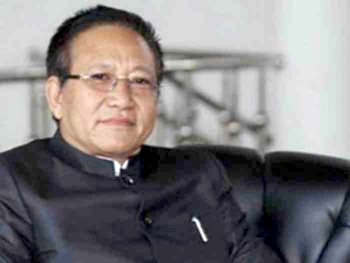Kohima, Feb 20: Bowing to the opponents of reservation for women in urban local bodies, Nagaland chief minister T R Zeliang resigned from office late on Sunday and called an emergency meeting of the ruling Naga People's Front on Monday to select his successor.
 Adding to the suspense over the power struggle that has gripped the state since Wednesday , the CM's office issued two statements in three hours, the first expressing Zeliang's decision to quit office and the second informing about him submitting his resignation to governor P B Acharya.
Adding to the suspense over the power struggle that has gripped the state since Wednesday , the CM's office issued two statements in three hours, the first expressing Zeliang's decision to quit office and the second informing about him submitting his resignation to governor P B Acharya.
Zeliang was quoted as saying, "The central leaders and some groups whom I met in Delhi told me that they have received suggestions that Lok Sabha MP Neiphiu Rio should come back take over the helm of affairs."
The statement said reports sent by the governor, the Intelligence Bureau, Assam Rifles, the CRPF and Congress had recommended immediate imposition of President's Rule on grounds of "a breakdown of government machinery". Quoting Zeliang, it added, "I told them that the Naga people cannot afford to have President's Rule when the political talks are going ahead to solve the Naga political issues (suggesting NSCN-IM)."
Two major anti-reservation groups, the Nagaland Tribes' Action Committee and the Joint Coordination Committee, have been carrying out a relentless campaign for Zeliang's sacking since the death of two people in police firing during a protest Dimapur on January 31.
Zeliang issued the first statement after he arrived here from New Delhi at 2.25pm and held a meeting with NPF president Shurhozelie Lieziestu, who was on Wednesday chosen as the next CM by 42 ruling party and Independent MLAs. At that time, Zeliang was in Delhi waiting to meet Union home minister Rajnath Singh.
On Saturday night, 49 legislators, including the 39 who had earlier supported Lieziestu, agreed "in principle" to back NPF Lok Sabha member Neiphiu Rio as the next CM when the latter met them at a resort at Assam's Kaziranga National Park.






Comments
Add new comment